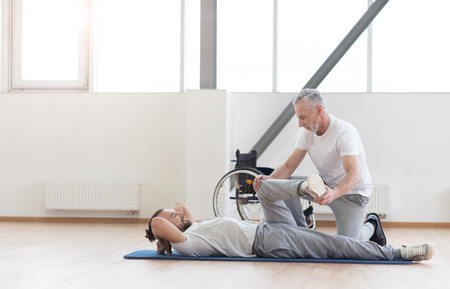Introduction to Tai Chi and Qigong: Ancient Arts in a Modern UK Context
Tai Chi and Qigong, deeply rooted in traditional Chinese medicine, have long been revered for their holistic approach to health and well-being. These gentle movement arts blend slow, flowing postures with mindful breathing and focused intention, embodying the core principles of balance, harmony, and energy cultivation that are central to Eastern wellness philosophies. Originally developed centuries ago as both martial arts and healing practices, Tai Chi and Qigong were designed to harmonise body, mind, and spirit. In recent years, these ancient disciplines have found a welcome place within the modern UK landscape, especially among older adults seeking accessible ways to nurture physical vitality and mental clarity. As awareness grows about the interconnectedness of physical and emotional health—an idea long embraced by Chinese medicine—the British public is increasingly turning to Tai Chi and Qigong as meaningful tools for ageing gracefully. This cultural shift reflects not only an appreciation for the gentle yet profound benefits of these practices but also a recognition of their adaptability within local community centres, parks, and health initiatives across the UK.
2. Physical Health Benefits: Enhancing Mobility and Balance
Tai Chi and Qigong are gentle yet powerful practices that offer a wealth of physical health benefits, making them particularly well-suited for older adults across the UK. Rooted in traditional Chinese medicine philosophy, these exercises focus on slow, deliberate movements coordinated with breath and mental intention, promoting harmony between body and mind. Regular practice can make a significant difference in mobility, joint health, flexibility, and balance—key factors in maintaining independence and quality of life as we age.
Supporting Joint Health and Flexibility
Both Tai Chi and Qigong involve fluid, circular movements that gently mobilise the joints without placing undue stress upon them. This makes these practices ideal for those managing conditions like arthritis or stiffness commonly found among Britain’s ageing population. Over time, participants often notice increased range of motion and reduced discomfort during daily activities.
Benefits Comparison Table
| Physical Aspect | Tai Chi & Qigong Impact |
|---|---|
| Joint Health | Improves lubrication and reduces stiffness |
| Flexibility | Enhances muscle elasticity and range of movement |
| Balance | Strengthens stabilising muscles to prevent falls |
| Coordination | Refines motor skills through mindful movement |
Reducing Fall Risk: A British Public Health Perspective
One of the most pressing concerns for older adults in the UK is the risk of falls, which can lead to serious injury or loss of confidence. NHS guidance increasingly recognises exercise interventions that target balance and strength as effective preventive measures. Tai Chi and Qigong excel in this area by training postural awareness, leg strength, and proprioception—the body’s sense of its position in space—helping to reduce fall risk significantly.
Cultural Suitability for the UK’s Ageing Population
The inclusive nature of Tai Chi and Qigong means classes can be easily adapted for community centres, village halls, or even gardens across Britain. Their low-impact style is particularly inviting for those who might shy away from more vigorous forms of exercise. By supporting both mobility and confidence in movement, these practices encourage continued participation in beloved local activities—from rambling walks to gardening—preserving cherished aspects of British life well into later years.

3. Cultivating Emotional and Mental Wellbeing
In the context of British culture, where emotional balance and a good night’s sleep are highly valued, Tai Chi and Qigong offer a gentle yet effective way to nurture mental wellbeing in later life. The slow, deliberate movements and mindful breathing inherent to both practices work harmoniously to reduce stress levels—a concern frequently reported by older adults in the UK. By engaging in these ancient arts, elderly Britons can cultivate a calm mind, which has been linked through both Eastern wisdom and modern research to improvements in mood and overall outlook on life.
One of the most commonly observed benefits of regular Tai Chi and Qigong practice is improved sleep quality. Difficulty sleeping or restlessness at night often accompany ageing, yet studies have shown that the meditative aspects of these disciplines help regulate the body’s circadian rhythms. Through mindful movement and focused attention, practitioners experience a deeper relaxation before bedtime, supporting more restorative sleep patterns that are essential for physical healing and mental clarity.
Furthermore, the mindfulness cultivated during practice extends beyond class time, encouraging participants to approach daily challenges with greater patience and resilience. This holistic approach resonates with the NHS emphasis on prevention and self-care, empowering older adults to take an active role in maintaining their emotional health. By integrating Tai Chi and Qigong into daily routines—whether in a local community centre or amidst the tranquillity of a British garden—elderly individuals not only support their own wellbeing but also foster a sense of connection within their communities.
4. Social Connections and Community Engagement
Group practice of Tai Chi and Qigong offers much more than physical movement; it is a powerful catalyst for social inclusion and community engagement, especially for older adults in the UK. In many British towns and villages, loneliness remains a significant concern among the elderly population. Tai Chi and Qigong classes, often held in local community centres, parks, or village halls, provide a welcoming space where individuals can meet regularly, share experiences, and build meaningful relationships.
Combating Loneliness Through Group Practice
The act of practising together fosters a sense of belonging. The gentle encouragement from instructors and mutual support among peers can break down barriers of isolation, which is crucial in enhancing emotional wellbeing. This sense of camaraderie is particularly valued in UK culture, where community ties are often nurtured through regular gatherings and shared activities.
Strengthening Community Ties
Tai Chi and Qigong groups frequently become micro-communities that extend beyond the practice itself. Participants may organise social events, tea breaks after sessions, or even cultural outings together. These activities reinforce the importance of collective wellbeing—a principle that resonates deeply with holistic health philosophies and traditional Chinese medicine, emphasising harmony between individuals and their environment.
How Group Practice Benefits Older Adults
| Benefit | Description |
|---|---|
| Social Inclusion | Regular interaction helps older adults feel accepted and valued within their community. |
| Reduced Loneliness | Opportunities to connect with others lessen feelings of isolation common among the elderly. |
| Community Participation | Engagement in group activities encourages continued involvement in local events and initiatives. |
By fostering these connections, Tai Chi and Qigong not only enrich the individual but also contribute to vibrant, supportive communities throughout the UK—reflecting both Eastern principles of balance and the cherished British value of community spirit.
5. Practical Guidance: Integrating Tai Chi and Qigong into UK Lifestyles
Embracing Tai Chi and Qigong as part of daily life can offer a wealth of physical and mental benefits for older adults in the UK. These ancient practices, rooted in the philosophy of harmony between mind and body, can be seamlessly incorporated into British routines with the right support and resources.
Finding Local Classes Across the UK
Many community centres, leisure facilities, and health clubs across the UK now offer Tai Chi and Qigong sessions tailored to older adults. To locate suitable classes, consult your local council’s website, the NHS directory, or Age UK’s community resources. Additionally, some local Chinese medicine practitioners or holistic wellness centres provide small group or one-to-one instruction that can be adapted to individual needs.
Adapting Movements for All Abilities
Tai Chi and Qigong are inherently adaptable. Experienced instructors in the UK understand the varied physical abilities within older adult groups and can modify movements for those with joint concerns, limited mobility, or chronic conditions. Gentle seated versions or supported standing exercises ensure everyone can participate safely. It’s always recommended to inform your instructor of any health conditions so they can personalise your practice.
Accessing Support within Healthcare and Community Settings
The integration of Tai Chi and Qigong into mainstream health advice is growing in the UK. Some NHS trusts refer patients to these practices as part of social prescribing schemes, especially for falls prevention or stress management. You may also find support through local charities or wellbeing hubs focused on senior health. Online resources from reputable organisations, such as the British Council for Chinese Martial Arts (BCCMA) or NHS-approved exercise guides, can help you begin your journey from home if in-person classes aren’t accessible.
By tapping into these practical avenues—whether through local classes, adaptations for individual needs, or community healthcare initiatives—older adults in the UK can harness the restorative powers of Tai Chi and Qigong to nurture both body and mind in harmony with traditional wisdom and modern living.
6. Perspectives from Traditional Chinese Medicine: Harmony of Body and Mind
Tai Chi and Qigong are deeply rooted in the wisdom of Traditional Chinese Medicine (TCM), which emphasises the harmonious balance between body and mind as the cornerstone of wellbeing. In TCM philosophy, health is maintained by cultivating the smooth and abundant flow of Qi, or vital energy, throughout the body’s meridian system. When Qi moves freely, it nourishes tissues, strengthens immunity, and supports mental clarity—qualities that are especially beneficial for older adults seeking to maintain independence and vitality in their later years.
Through slow, mindful movements combined with gentle breathing techniques, Tai Chi and Qigong offer a practical way to clear blockages and promote balance within both the physical body and emotional state. These practices encourage relaxation of tense muscles, improve joint mobility, and foster stability—all crucial factors for fall prevention among elderly individuals in the UK. At the same time, their meditative aspects help to calm the mind, reduce feelings of anxiety, and enhance overall emotional resilience.
From a Western perspective, such preventative approaches align well with current public health recommendations for older people: regular gentle exercise, stress management, and social engagement. Many British GPs now recognise these ancient methods as effective adjuncts to conventional care. By integrating Tai Chi and Qigong into daily routines, older adults can support cardiovascular health, improve sleep quality, and nurture a sense of purpose—mirroring TCM’s holistic view that the mind and body must work together in harmony for true health.
Ultimately, Tai Chi and Qigong bridge Eastern tradition with Western scientific understanding by offering accessible tools for self-care. Whether practised in community centres across London or tranquil village halls in the English countryside, they empower older adults to take an active role in safeguarding their long-term wellbeing—embodying the timeless principle that prevention is better than cure.
7. Conclusion: Embracing Mindful Movement for Healthy Ageing
In summary, the practice of Tai Chi and Qigong offers a wealth of physical and mental benefits that are particularly valuable for older adults living in the UK. Rooted in the wisdom of traditional Chinese medicine, these gentle yet profound exercises nurture both body and mind, helping to harmonise energy flow, strengthen balance, and foster inner tranquillity. As we age, embracing mindful movement becomes an essential path to longevity and a more vibrant quality of life. By integrating Tai Chi and Qigong into daily routines, seniors can cultivate resilience, enhance self-healing capacities, and rediscover joy in every moment. In the context of British culture—where community connection and outdoor activity are highly valued—practising together in parks or local halls adds another layer of enjoyment and well-being. Ultimately, Tai Chi and Qigong empower older adults across the UK to age gracefully, maintain independence, and experience a renewed sense of purpose through holistic self-care.


